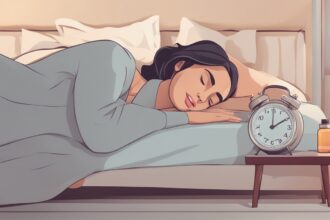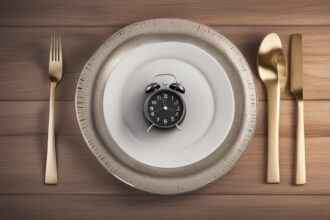Have you ever wondered how fasting affects your sleep, or if poor sleep could be messing with your fasting goals? If you’re someone who practices intermittent fasting or extended fasts for health, weight loss, or spiritual reasons, you’ve likely noticed that your eating patterns can influence how well you rest at night. The relationship between sleep and fasting is a fascinating one, with science showing both benefits and challenges. In this post, we’ll dive deep into how fasting impacts sleep quality, how sleep affects hunger and fasting success, and practical ways to optimize both for better health. Whether you’re a seasoned faster or just curious about the connection, stick around for insights backed by research and actionable tips to help you find balance.
The Science Behind Sleep and Fasting: What’s the Connection?
Let’s start by unpacking the biological link between sleep and fasting. When you fast, your body undergoes metabolic shifts, including changes in hormone levels like insulin, ghrelin (the hunger hormone), and leptin (the satiety hormone). These hormones don’t just regulate appetite; they also play a role in your sleep-wake cycle. For instance, fasting can influence melatonin production, the hormone responsible for signaling bedtime to your brain (Walker, 2017). Studies suggest that fasting, especially time-restricted eating, may align with your circadian rhythm—the internal clock that governs sleep—potentially improving rest when done consistently (Longo & Mattson, 2014).
However, the flip side is that fasting can also disrupt sleep, particularly if you’re new to it or not managing your eating windows well. Hunger pangs or low blood sugar during fasting periods might make it harder to fall asleep or stay asleep. Plus, if you’re fasting late into the evening, your body might be too alert or stressed to wind down. Understanding this push-and-pull dynamic is key to making fasting and rest work together.
How Fasting Affects Sleep Quality
Fasting can have both positive and negative effects on how well you sleep, depending on the type of fast and your body’s adaptation. On the positive side, intermittent fasting (IF), such as the 16:8 method (fasting for 16 hours, eating during an 8-hour window), has been linked to improved sleep efficiency in some studies. This is partly because fasting can reduce late-night eating, which often disrupts digestion and sleep (Paoli et al., 2019). When you stop eating a few hours before bed, your body isn’t busy processing food, allowing it to focus on restorative processes during sleep.
On the downside, fasting—especially prolonged fasts—can increase cortisol levels, a stress hormone that may keep you wired at night (Cahill, 2006). If you’ve ever laid awake during a fast feeling restless or hungry, this could be why. Additionally, dehydration or electrolyte imbalances during fasting might lead to cramps or discomfort, further impacting your rest. The key takeaway? How fasting impacts sleep varies from person to person, and timing your eating window can make a big difference.
How Sleep Influences Fasting Success
Just as fasting can affect your sleep, the quality of your rest plays a huge role in how well you stick to your fasting routine. Poor sleep messes with your hunger hormones, increasing ghrelin and decreasing leptin, which can make fasting feel like an uphill battle (Spiegel et al., 2004). Ever notice how you crave junk food after a bad night’s sleep? That’s your body trying to compensate for low energy with quick calories, making it harder to resist breaking your fast early.
Moreover, lack of sleep can sap your willpower and increase stress, both of which can derail your fasting goals. On the other hand, getting enough quality rest helps stabilize blood sugar and reduces cravings, making it easier to maintain your fasting schedule. Prioritizing sleep during fasting isn’t just about feeling refreshed—it’s a strategic move for long-term success.
Practical Tips to Improve Sleep While Fasting
Now that we’ve covered the science, let’s get into some real-world strategies to optimize sleep and fasting. These tips are designed to help you avoid common pitfalls and create a routine that supports both your fasting goals and restful nights.
- Time Your Eating Window Wisely: Try to finish your last meal at least 2–3 hours before bedtime. This gives your body time to digest and prevents discomfort or acid reflux that can disrupt sleep.
- Stay Hydrated: Dehydration during fasting can lead to headaches or cramps that wake you up. Sip water throughout your eating window, and consider adding a pinch of salt if you’re on a longer fast to maintain electrolytes.
- Wind Down with a Routine: Fasting can sometimes leave you feeling wired. Create a calming pre-sleep ritual, like reading or meditating, to signal to your brain that it’s time to rest.
- Avoid Caffeine Late in the Day: If you’re fasting, you might rely on coffee to curb hunger, but caffeine too close to bedtime can sabotage your sleep. Cut off caffeine at least 6 hours before you plan to hit the hay.
Strategies to Support Fasting with Better Sleep
Improving your sleep can also make fasting feel less daunting. Here are some ways to ensure your rest supports your fasting journey, helping you stay committed without feeling deprived or exhausted.
- Aim for 7–9 Hours of Sleep: Adequate rest helps regulate appetite hormones, making fasting easier. Set a consistent bedtime to hit this target (Walker, 2017).
- Limit Screen Time Before Bed: Blue light from phones or laptops can suppress melatonin and delay sleep onset. Try to unplug at least 30 minutes before bed.
- Create a Sleep-Friendly Environment: Keep your bedroom dark, quiet, and cool to promote deeper sleep, which in turn supports fasting by reducing stress and cravings.
- Consider a Nap (If Needed): If fasting leaves you fatigued, a short 20–30 minute nap during the day can recharge you without disrupting nighttime sleep.
Common Challenges and How to Overcome Them
Let’s be real—combining sleep and fasting isn’t always smooth sailing. Hunger-induced insomnia, irritability, or energy crashes are common hurdles. If you’re waking up in the middle of the night starving, try sipping herbal tea or water during your fasting window to trick your stomach into feeling fuller. If stress from fasting keeps you up, practice deep breathing or progressive muscle relaxation to calm your nervous system. And if you’re feeling sluggish, don’t push yourself too hard—listen to your body and adjust your fasting duration or eating window as needed. Remember, fasting is a tool, not a punishment, and pairing it with good sleep hygiene can make all the difference.
Another challenge is social eating. Late-night gatherings or family dinners can throw off your fasting and sleep schedule. Plan ahead by communicating your goals with loved ones or shifting your eating window slightly on those days. Flexibility is key to sustaining fasting and rest long-term without feeling isolated or stressed.
In wrapping up, the relationship between sleep and fasting is a two-way street. fasting can enhance sleep by aligning with your body’s natural rhythms, but it can also pose challenges like hunger or stress that disrupt rest. Meanwhile, quality sleep supports fasting by curbing cravings and boosting willpower. By timing your meals, staying hydrated, and prioritizing rest, you can create a synergy between these two powerful health practices. Experiment with the tips shared here, and don’t be afraid to tweak your approach until you find what works for you. After all, health isn’t one-size-fits-all—it’s about finding balance. How have you noticed fasting impacting sleep in your own life? Drop your thoughts below—I’d love to hear your story!
References
- Cahill, G. F. (2006). Fuel metabolism in starvation. Annual Review of Nutrition, 26, 1–22. https://doi.org/10.1146/annurev.nutr.26.061505.111258
- Longo, V. D., & Mattson, M. P. (2014). Fasting: Molecular mechanisms and clinical applications. Cell Metabolism, 19(2), 181–192. https://doi.org/10.1016/j.cmet.2013.12.008
- Paoli, A., Tinsley, G., Bianco, A., & Moro, T. (2019). The influence of meal frequency and timing on health in humans: The role of fasting. Nutrients, 11(4), 719. https://doi.org/10.3390/nu11040719
- Spiegel, K., Tasali, E., Penev, P., & Van Cauter, E. (2004). Brief communication: Sleep curtailment in healthy young men is associated with decreased leptin levels, elevated ghrelin levels, and increased hunger and appetite. Annals of Internal Medicine, 141(11), 846–850. https://doi.org/10.7326/0003-4819-141-11-200412070-00008
- Walker, M. P. (2017). Why we sleep: Unlocking the power of sleep and dreams. Scribner.






